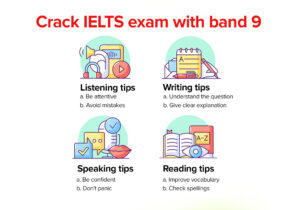The International English Language Testing System (IELTS) is a widely recognized English language proficiency exam taken by millions of individuals worldwide. Whether for academic or immigration purposes, achieving a high score in the IELTS exam is crucial for opening doors to various opportunities. To excel in this test, it is essential to adopt effective strategies and dedicated preparation. In this article, we will explore 10 key ways to ace your IELTS exam, ranging from understanding the test format to mastering time management and improving language skills. By following these tips, you can approach the exam with confidence and increase your chances of achieving outstanding results.
Understand the Test Format: Before you start preparing for the IELTS exam, it’s essential to familiarize yourself with the test format. Understand the structure of each section, the number of questions, and the time allotted for each part. Tutoronics has online tuition and IELTS crash courses that can help you plan your study schedule effectively and allocate time based on the weightage of each section.
Practice Regularly: Consistent and dedicated practice is crucial for improving your language skills and overall performance in the exam. Set aside time each day for IELTS practice, covering all four sections – Listening, Reading, Writing, and Speaking. Regular practice will help you build confidence and fluency, reducing test-day anxiety.
Take Mock Tests: Mock tests are invaluable tools for simulating the actual exam environment. Taking full-length mock tests will familiarize you with the test conditions, such as time constraints and question patterns. Analyze your performance in each section and identify areas where you need improvement.
Expand Vocabulary: Vocabulary plays a significant role in IELTS, especially in the Writing and Speaking sections. Work on expanding your vocabulary by learning new words and their usage in different contexts. Practice incorporating these words into your speaking and writing exercises to demonstrate a higher level of language proficiency. Taking up creative writing or vocaburary building courses can boost potential. Inquire now.
Develop Reading Skills: The Reading section can be challenging due to the time pressure and the variety of texts presented. To improve your reading comprehension, read a diverse range of materials, such as news articles, academic papers, and literature. Pay attention to the main ideas, supporting details, and overall tone of the texts.
Listen Actively: Active listening is a crucial skill for the Listening section. Engage in regular listening practice by watching English movies, documentaries, and podcasts. Focus on understanding the context, key points, and details presented in spoken language. This will help you develop better listening comprehension and improve your ability to answer questions accurately.
Master Time Management: Time management is essential during the IELTS exam to ensure you complete all sections within the given time frame. Practice answering questions under timed conditions to improve your speed and accuracy. Develop strategies to prioritize questions and allocatetime wisely to maximize your score.
Practice Writing Essays: The Writing section requires strong writing skills, including the ability to organize ideas coherently and convey arguments effectively. Practice writing essays on various topics, covering both Task 1 (graph description, table, or diagram) and Task 2 (essay). Seek feedback from teachers or peers to identify areas for improvement. You can submit your work to our highly qualified online IELTS tutors who can assist further enhancing your work.
Improve Grammar and Punctuation: A strong command of grammar and punctuation is essential for clear and error-free communication in the Writing and Speaking sections. Review grammar rules, sentence structures, and punctuation marks. Avoid common mistakes and practice applying grammatical rules in your writing and speaking exercises.
Get Adequate Rest: In the days leading up to the exam, ensure you get enough rest and sleep. Being well-rested will help you stay focused and alert during the test, enhancing your performance. Avoid last-minute cramming and trust in the preparation you have done so far.

In conclusion, acing the IELTS exam requires consistent effort, strategic planning, and thorough preparation across all four sections. By understanding the test format, practicing regularly, taking mock tests, expanding vocabulary, developing reading and listening skills, mastering time management, practicing writing essays, and improving grammar and punctuation, you can significantly increase your chances of achieving your desired results. Remember to stay calm, confident, and focused on test day, and trust in your abilities. Good luck on your IELTS journey!
